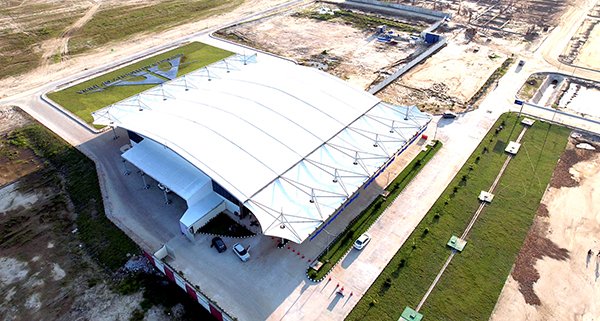
PROJECT BRIEF
The design of the new Trichy Airport has been created by fusing references from the city’s local heritage and culture along with a contemporary palette of materials. This has given the structure a unique sense of place and identity. The terminal building at Trichy Airport also has a GRIHA four-star rating since the design utilizes renewable energy measures such as rainwater harvesting, ground source heat pumps and photovoltaic panels.
CLIENT BRIEF
The client’s expectation was to construct a new terminal building that includes dwell zones, retail and comfort zones as key aspects and integrate local architecture into a modern design. The brief provided was to take references from the local culture and traditional architecture and that express them through the building’s architecture. The passengers would feel the local culture and would, in turn, give them a quick taste of the city’s vibe. Keeping this vision in mind, the client also wanted the terminal building to be positioned parallel to the runway.
CHALLENGES
Integration of the local architecture into a modern context, such as roofing system, entry and exit gates/ vestibule and flooring from temples in Trichy posed as a challenge to the team since it is difficult to integrate such elements together into the desired context. The application and erection of the complex roof design with a two-way elliptical slope roof was yet another challenge.
The biggest challenge that no one predicted was the pandemic. Building a structure during Covid-19 in India brought with it a whole new set of challenges. The timeline of the project was extended due to the restrictions, manpower suddenly dwindled and the execution had to be done with a lower workforce. In addition, the cost of the raw material had also increased during this time.
CHOICE OF MATERIAL
Steel was the obvious choice for a structure like that of this project due to its many benefits. Steel has strength, is durable, versatile, lightweight, cost-effective and fire-resistant.
UNIQUENESS
Hollow steel sections have been used for the trusses, which give a good appearance as well as the least vulnerable to local buckling effects structurally. Box trusses are provided to take better stability of the roof against wind and earthquake loads. Additionally, the trusses provide ease of transportation and assembly of individual lightweight elements. Also, the used Yield Strength of Members is 310 mpa instead of 250 mpa to provide higher strength against bending and deflection.
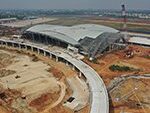

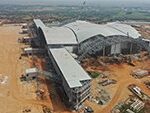





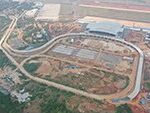



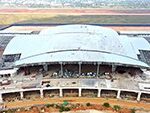



STRUCTURAL DETAILS
- Longer spans of 38 meters
- Long Cantilever Spans approximately 32 meters and is provided with a depth of a maximum of 3 meters to minimize deflections
- Double Curvature roof
- Primary frame for the roofing structure designed in 3D Truss of 3 meters width (C/C of member) and 3 meters depth (O/O of member)
Secondary frames for the roofing structure are used to connect the primary - Truss frame to the primary Truss frame for structure connectivity and are plane truss sections of 3 meter depth (O/O of member)
Primary frames are supported by RCC capital/column while secondary frames are supported by the primary frame
Truss Frames are more suitable to resist heavy deflection due to large spans (Simply supported and Cantilever) and distortion - Square hollow sections are considered in design as per the following advantages which are ease of availability, connection feasibility and structural stability
Square hollow sections used for the frames are providing additional stability due to equal moment of inertia in both the axis






